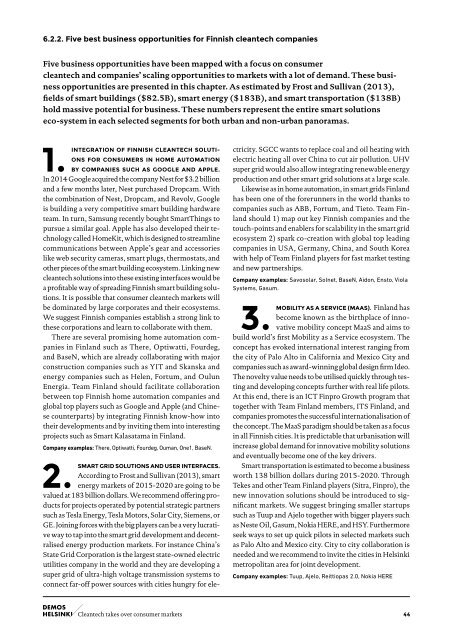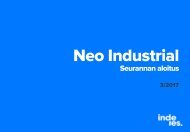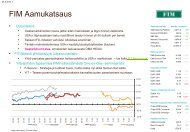Cleantech takes over consumer markets
Consumer_Cleantech_Report1
Consumer_Cleantech_Report1
- No tags were found...
Create successful ePaper yourself
Turn your PDF publications into a flip-book with our unique Google optimized e-Paper software.
6.2.2. Five best business opportunities for Finnish cleantech companies<br />
Five business opportunities have been mapped with a focus on <strong>consumer</strong><br />
cleantech and companies’ scaling opportunities to <strong>markets</strong> with a lot of demand. These business<br />
opportunities are presented in this chapter. As estimated by Frost and Sullivan (2013),<br />
fields of smart buildings ($82.5B), smart energy ($183B), and smart transportation ($138B)<br />
hold massive potential for business. These numbers represent the entire smart solutions<br />
eco-system in each selected segments for both urban and non-urban panoramas.<br />
1.<br />
INTEGRATION OF FINNISH CLEANTECH SOLUTI-<br />
ONS FOR CONSUMERS IN HOME AUTOMATION<br />
BY COMPANIES SUCH AS GOOGLE AND APPLE.<br />
In 2014 Google acquired the company Nest for $3.2 billion<br />
and a few months later, Nest purchased Dropcam. With<br />
the combination of Nest, Dropcam, and Revolv, Google<br />
is building a very competitive smart building hardware<br />
team. In turn, Samsung recently bought SmartThings to<br />
pursue a similar goal. Apple has also developed their technology<br />
called HomeKit, which is designed to streamline<br />
communications between Apple’s gear and accessories<br />
like web security cameras, smart plugs, thermostats, and<br />
other pieces of the smart building ecosystem. Linking new<br />
cleantech solutions into these existing interfaces would be<br />
a profitable way of spreading Finnish smart building solutions.<br />
It is possible that <strong>consumer</strong> cleantech <strong>markets</strong> will<br />
be dominated by large corporates and their ecosystems.<br />
We suggest Finnish companies establish a strong link to<br />
these corporations and learn to collaborate with them.<br />
There are several promising home automation companies<br />
in Finland such as There, Optiwatti, Fourdeg,<br />
and BaseN, which are already collaborating with major<br />
construction companies such as YIT and Skanska and<br />
energy companies such as Helen, Fortum, and Oulun<br />
Energia. Team Finland should facilitate collaboration<br />
between top Finnish home automation companies and<br />
global top players such as Google and Apple (and Chinese<br />
counterparts) by integrating Finnish know-how into<br />
their developments and by inviting them into interesting<br />
projects such as Smart Kalasatama in Finland.<br />
Company examples: There, Optiwatti, Fourdeg, Ouman, One1, BaseN.<br />
2.<br />
SMART GRID SOLUTIONS AND USER INTERFACES.<br />
According to Frost and Sullivan (2013), smart<br />
energy <strong>markets</strong> of 2015-2020 are going to be<br />
valued at 183 billion dollars. We recommend offering products<br />
for projects operated by potential strategic partners<br />
such as Tesla Energy, Tesla Motors, Solar City, Siemens, or<br />
GE. Joining forces with the big players can be a very lucrative<br />
way to tap into the smart grid development and decentralised<br />
energy production <strong>markets</strong>. For instance China’s<br />
State Grid Corporation is the largest state-owned electric<br />
utilities company in the world and they are developing a<br />
super grid of ultra-high voltage transmission systems to<br />
connect far-off power sources with cities hungry for electricity.<br />
SGCC wants to replace coal and oil heating with<br />
electric heating all <strong>over</strong> China to cut air pollution. UHV<br />
super grid would also allow integrating renewable energy<br />
production and other smart grid solutions at a large scale.<br />
Likewise as in home automation, in smart grids Finland<br />
has been one of the forerunners in the world thanks to<br />
companies such as ABB, Fortum, and Tieto. Team Finland<br />
should 1) map out key Finnish companies and the<br />
touch-points and enablers for scalability in the smart grid<br />
ecosystem 2) spark co-creation with global top leading<br />
companies in USA, Germany, China, and South Korea<br />
with help of Team Finland players for fast market testing<br />
and new partnerships.<br />
Company examples: Savosolar, Solnet, BaseN, Aidon, Ensto, Viola<br />
Systems, Gasum.<br />
3.<br />
MOBILITY AS A SERVICE (MAAS). Finland has<br />
become known as the birthplace of innovative<br />
mobility concept MaaS and aims to<br />
build world’s first Mobility as a Service ecosystem. The<br />
concept has evoked international interest ranging from<br />
the city of Palo Alto in California and Mexico City and<br />
companies such as award-winning global design firm Ideo.<br />
The novelty value needs to be utilised quickly through testing<br />
and developing concepts further with real life pilots.<br />
At this end, there is an ICT Finpro Growth program that<br />
together with Team Finland members, ITS Finland, and<br />
companies promotes the successful internationalisation of<br />
the concept. The MaaS paradigm should be taken as a focus<br />
in all Finnish cities. It is predictable that urbanisation will<br />
increase global demand for innovative mobility solutions<br />
and eventually become one of the key drivers.<br />
Smart transportation is estimated to become a business<br />
worth 138 billion dollars during 2015-2020. Through<br />
Tekes and other Team Finland players (Sitra, Finpro), the<br />
new innovation solutions should be introduced to significant<br />
<strong>markets</strong>. We suggest bringing smaller startups<br />
such as Tuup and Ajelo together with bigger players such<br />
as Neste Oil, Gasum, Nokia HERE, and HSY. Furthermore<br />
seek ways to set up quick pilots in selected <strong>markets</strong> such<br />
as Palo Alto and Mexico city. City to city collaboration is<br />
needed and we recommend to invite the cities in Helsinki<br />
metropolitan area for joint development.<br />
Company examples: Tuup, Ajelo, Reittiopas 2.0, Nokia HERE<br />
<strong>Cleantech</strong> <strong>takes</strong> <strong>over</strong> <strong>consumer</strong> <strong>markets</strong><br />
44






